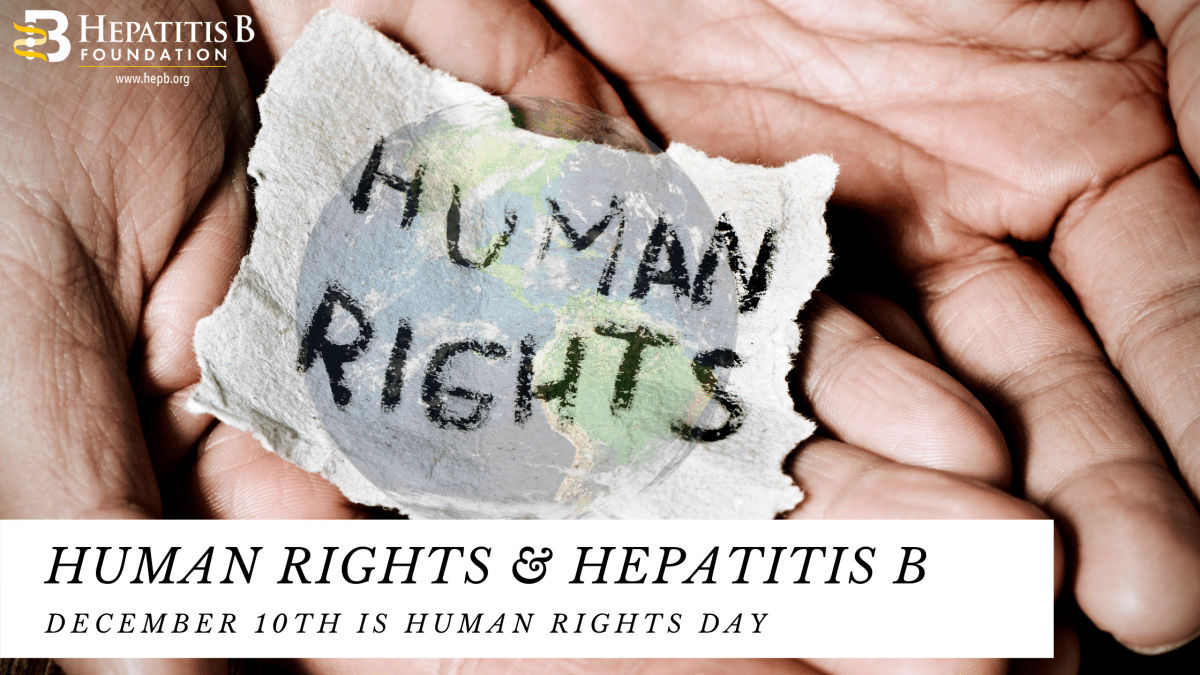
Tomorrow, December 10th is Human Rights Day! Every December, this day “proclaims the inalienable rights which everyone is entitled to as a human being – regardless of race, colour, religion, sex, language, political or other opinion, national or social origin, property, birth or other status1” This year’s theme is: Recover Better- Stand up for Human Rights as it relates to the impacts of the COVID-19 pandemic. This day will emphasize the importance of human rights in recovery efforts to “create equal opportunities for all, address the failures exposed and exploited by COVID-19, and apply human rights standards to tackle entrenched, systematic, and intergenerational inequalities, exclusion and discrimination1”.
Impact of COVID-19, Hepatitis B, and Human Rights
The World Health Organization (WHO) states that people living with underlying health conditions such as hepatitis B can put them at a greater risk for a poorer COVID-19 prognosis2. COVID-19 has paused many organizations’ outreach and work which disproportionately affects already marginalized populations. Additionally, in the United States, COVID has raised unemployment rates to an estimated 25%3. Organizations are unable to provide viral hepatitis programs which can negatively affect people living with hepatitis B, like knowing their status, linkage to care, and management of their disease. Additionally, if people are experiencing unemployment and living with hepatitis B, their healthcare costs could significantly increase. This might make it difficult for people living with hepatitis B to effectively manage their disease. These situations directly violate the fundamental human right to healthcare – people should have access to healthcare services without financial hardship. With COVID-19 impacting organizations like the Hepatitis B Foundation, what are we doing to address these situations?
How Are We Addressing Inequalities?
The Hepatitis B Foundation is committed to human rights and the rights of people living with hepatitis B prior to COVID-19, during COVID-19, and will continue to do so after. The Foundation has advocated for persons living with hepatitis B and experiencing discrimination. We are proud to have had a part in a landmark settlement by the U.S. Department of Justice in 2013, which ruled that a medical school had violated the Americans with Disabilities Act (ADA) when they denied applicants because they had hepatitis B. Take a look at our Know Your Rights Section if you are experiencing discrimination while living with hepatitis B. The Hepatitis B Foundation also launched a new tool to assist people living with hepatitis B in making decisions on health insurance. The report provides health insurance shoppers living with hepatitis B with key information – including a checklist of questions to consider and a list of insurance companies in the analyzed states that exhibited discriminatory practices. Health insurance shoppers can take a closer look at the specific pricing tiers into which companies and plans place their hepatitis B treatments, and what additional costs may be included.
Currently, Hep B United Philadelphia, a coalition member of Hep B United, a national coalition founded under the Hepatitis B Foundation, is committed to serving the Greater Philadelphia Community during the pandemic. Hep B United Philadelphia rolled out a “contactless screening” program which allows individuals to get free hepatitis B testing. They have also hosted hepatitis B educational sessions over Zoom in multiple languages. Recordings and resources are available for use here.
References
Author: Evangeline Wang, Program Coordinator
Contact Information: info@hepb.org

